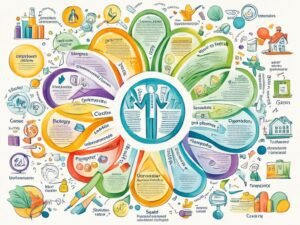Depression impacts 6.7% of adults in the U.S., says the National Institute of Mental Health. While treatments like therapy and medicine are common, some people look for alternative and complementary approaches. We will look into several natural remedies and holistic therapies that could help. This includes herbal supplements, nutrient-based interventions, mindfulness practices, and lifestyle changes. Our aim is to show you safe options that might help. You can try these along with or instead of standard treatments.
Key Takeaways
- Explore a range of natural remedies and holistic therapies to manage depression symptoms, including herbal supplements, nutrient-based interventions, mindfulness practices, and lifestyle changes.
- Understand the importance of researching the effectiveness and safety of alternative treatments, as many are not regulated by the FDA like conventional medications.
- Consider an integrative approach that combines conventional and alternative therapies to personalize your depression management plan.
- Prioritize mind-body practices like meditation and yoga, which can have a positive impact on mood and overall well-being.
- Adopt healthy lifestyle habits, such as regular exercise, a nutrient-rich diet, and stress management techniques, to support your mental health.
Understanding Depression and Its Impact
Depression is a serious mood disorder. It affects how someone feels and acts. The symptoms of depression can show in many ways but often include feelings of sadness, hopelessness, and frustration. People with depression may also lose interest in things they once loved. This can make life very hard.
Depression also changes how our bodies feel. People might feel tired all the time or have trouble sleeping. They could also start eating more or less than usual. On top of that, their bodies might ache for no clear reason.
If not treated, depression can make daily life very hard. It can also cause major health issues. It’s important to know how depression affects us, so we can get the right help.
Recognizing the Symptoms of Depression
Depression shows up in many ways. People might always seem sad or not want to do things they used to enjoy. They may have trouble sleeping and eating right, feel tired all the time, and hurt physically.
The Emotional and Physical Toll
Depression really affects our lives. It makes it hard to be happy or do well at school or work. People might also find it tough to enjoy things or keep up with friends.
Feeling sad and hopeless all the time can be really tough. It fills us with frustration and makes it hard to live a good life. The tiredness, appetite changes, and sleep problems just make everything worse.
Conventional Treatments for Depression
The usual way to deal with depression is through talking with a therapist and taking medicine. Talking with a therapist can help you learn ways to deal with stress. You also learn how to think more positively and communicate better with others. This type of psychotherapy for depression gives you tools to feel better and live a fuller life.
Psychotherapy and Counseling
Besides talking, taking medicines called antidepressant medications is also very important. Doctors often give SSRIs, SNRIs, and tricyclic antidepressants. These help your brain’s chemicals get back in balance. They lessen sad feelings. Yet, sometimes, people look for different ways to help them feel better.
Antidepressant Medications
Remember, getting better with therapy and medicine might not happen right away. It usually takes four to eight weeks. For some, finding the right medicine might need trying a few types. They might also need to add other medicines. A test called pharmacogenetic testing can help find the best medicine for you. This can make your treatment spot on for your needs.
The Rise of Alternative and Complementary Therapies
More people are looking at new ways to deal with depression. They are finding that usual treatments might not work well. Some treatments could have bad effects, too.
So, they are trying things that look at the whole person. This includes what they eat, how they think, and their lifestyle. Each person may need something different to feel better.
There are many options to help with depression. Some use herbs and vitamins. Others focus on how the mind and body work together. Many people are seeing that these natural ideas can really make a difference.
Those who try these other ways to feel better are doing more than just taking medicine. They are playing a big part in getting well. This method combines what works in medicine with new, natural ideas for a better plan.
St. John’s Wort: An Herbal Remedy for Mild Depression
St. John’s wort is a popular herb for treating mild depression. It is known to work as well as some medicines. A 2016 review showed it can do better than a fake pill for those feeling blue.
Effectiveness and Safety Considerations
But, using it comes with warnings. There’s not enough info on how safe it is in the long run, especially for very sad people. St. John’s wort seems to help those with mild to medium sadness, not so much the very sad.
Potential Interactions with Medications
Another thing, it doesn’t mix well with common drugs like some pills, depression meds, and cancer drugs. So, if you’re thinking about using it, make sure to speak with your doctor first.
Omega-3 Fatty Acids: Nutrient Support for Mood
Omega-3 fatty acids are found in cold-water fish, flaxseed, and some other foods. They might help lift your spirit. Yet, a lot more research is needed to be sure they work well for everyone. Always check with a doctor before adding these to your diet, especially if you’re taking medicines. They might give you a fishy taste in your mouth.
Depression is a big issue many people face. Some studies say omega-3s could help. But, we need more good research to know for sure how helpful they are for cheering us up. It might be a good natural step to talk about with your doctor.
Saffron: The Golden Spice with Mood-Boosting Properties
Saffron is a bright spice that’s known for making people feel better. Some studies say it might help with feeling sad, or depression. In 2018, experts looked at saffron’s effects on depression and found it might help. But they said we need more good studies to be sure, and to check if it’s really safe.
But, not all saffron products are the same. It’s key to buy from places you trust. Always talk to a doctor before adding saffron to your health plan for depression.
| Saffron Compound | Potential Benefits |
|---|---|
| Crocin | May have antidepressant properties and protect brain cells against damage |
| Safranal | Research suggests it may benefit inflammation, asthma, hypertension, cancer, and depression |
| Picrocrocin | Contributes to the distinct flavor and aroma of saffron |
| Kaempferol | A powerful antioxidant found in saffron |
Saffron has been used for health benefits for a very long time, nearly 4,000 years. It’s super special, being the most costly spice out there. Always buy it from places you trust to make sure it’s pure.
depression alternative treatment
Looking into different ways to treat depression is smart. Yet, knowing the real facts about herbs and supplements is crucial. Some, like St. John’s wort and saffron, have done well in tests. But, we don’t have a lot of solid evidence on how well and safe these natural treatments really are. Remember, just because something is “natural” doesn’t mean it’s always safe. Some herbs might not mix well with medicines or could cause other problems.
Understanding the Science Behind Herbal Remedies
If you’re thinking of trying herbs or supplements, talking to your doctor is a must. They can be your guide. They’ll look at what might be good or bad for you. This way, they can make sure any natural treatments you use work well with your regular treatments, if you need them both.
Consulting with Healthcare Professionals
It’s best to team up with your doctor or other healthcare experts. They can help you learn more about how herbs might help with depression. And, you’ll be able to make smart choices. This plan makes it more likely that any extra treatments will help you feel better and stay safe. It adds to what you’re already doing to treat depression.
Mindfulness and Meditation: Calming the Mind
Alternative ways to manage depression include mindfulness and meditation. These methods aim to make the mind calm. They reduce stress and anxiety. This creates a better sense of emotional well-being. Many studies show that these practices can lessen depression. They help people pay attention to their thoughts and feelings without judging them.
Incorporating Mindfulness into Daily Life
Adding mindfulness to your day can help with depression. This can include guided meditation and being aware of your breath. It also means really paying attention to what’s around you. Doing this can make the hard feelings that come with depression easier. Mindfulness lets you be kind to yourself. You don’t have to be so hard on your thoughts. This can keep you from feeling worse.
Lifestyle Changes for Holistic Well-being
There’s more to fighting depression than just herbs and mental exercises. Making big lifestyle changes can really help. These changes work with other treatments to help you heal and feel stronger.
Exercise and Physical Activity
Getting regular exercise can lift your spirits. It also boosts your energy and makes your mind healthier. Try activities like running, lifting weights, or yoga to feel less stressed and beat the blues.
Nutrition and Diet
Eating foods packed with omega-3s and B vitamins can really help your mood. A diet full of these nutrients can make you feel better. It aids in other treatments too.
Stress Management Techniques
Learning ways to handle stress is key. Deep breathing, yoga, or talking with someone can help. They make you stronger against the bad feelings of depression.
By working on different parts of your life, you build a full attack against depression. It helps you choose the best mix of treatments for you.
Integrative Approaches: Combining Conventional and Alternative Therapies
Many people facing depression benefit from mixing regular and alternative treatments. An integrative approach to depression treatment links traditional and non-traditional methods. This mix helps customize care and improve results.
When you work with your healthcare team, you can check out various options. These can include talking therapies, medicines, natural supplements, and lifestyle changes. Finding what works best for you can boost your mental health and make it easier to recover.
| Conventional Therapies | Alternative Therapies |
|---|---|
| Psychotherapy (e.g., CBT, interpersonal therapy) | Herbal supplements (e.g., St. John’s wort, saffron) |
| Antidepressant medications (e.g., SSRIs, SNRIs) | Nutrient-based interventions (e.g., omega-3 fatty acids, folate) |
| – | Mindfulness and meditation practices |
| – | Lifestyle changes (e.g., exercise, nutrition, stress management) |
Working closely with your doctors and trying an integrative approach to depression treatment is key. Together, you can find the best mix of treatments for your unique situation. This can lead to better long-term mental well-being.
Conclusion
The way we treat depression has changed a lot. Now, we use many different kinds of treatments. These include both old and new ways. Using natural methods, like herbs, vitamins, and exercises, is showing promise for many.
It’s important to talk to your doctor about these options. They can help you pick what’s best for you. Being open to new ideas and staying active in your healing journey are key.
More and more, we’re seeing that mixing different treatments works well. By using varied therapies, including natural and traditional ones, people can find real relief. This approach leads to a better life for those living with depression.




